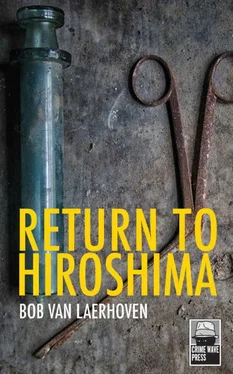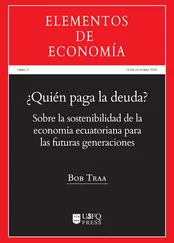I felt as if I was standing on the edge of a precipice. A single thought anchored in my head: why did I write things in my diary as a child that I later didn’t understand, as if they were written in a different language? The thought concealed a threat that seemed ready to devour me at any moment. Yori’s gentle touch and the way she looked at me made that feeling ebb away. “Let’s go,” she said.
And what did I do? I followed her like a giant pug into a smaller room next to the common area, the place where she and Reizo normally spent the night. She pulled me onto a futon surrounded by fluffy toys with big ears and baby eyes, the stuff she made to sell on the street. I surrendered. She threw her arms and legs around my huge ungainly body and held me tight as she caressed my hair. I floated off into a limbo where time and identity were non-existent. I opened my mouth and listened in astonishment to my story about the documents and the talisman I had found in the underground shelter on Hashima Island. I tried to stop myself but I couldn’t.
I explained the blood down below. I told her that I had taken documents from the island that could back-up my story if need be.
Yori said nothing the entire time. She rocked me to and fro as if she was the mother and I the child. When I finished my story there was a long silence. I felt lightheaded. I had finally been able to confess it all. Yori didn’t react directly to my story, but told me in her turn about her boyfriend and how he was losing his mind and what he had done to the foreigner she had met just to go one better on his idol Mishima. By the time she had said what she had to say I had made a decision. But first I asked her if she thought that Reizo Shiga was crazy.
Her answer felt like a kick in the stomach: “He’s not crazy. It’s much worse than that… he’s just pretending to be.”
Hiroshima – the canal behind the Genbaku dome – Takeda and Becht – March 14 th1995
Inspector Takeda and Beate Becht are sitting on a bench on the banks of the river Aioi near the place where Becht found the van. It’s humid. A stiff breeze heralds the typhoon season, which reaches its height in September. The air has pale yellow quality, shifting to ochre when thick clouds block out the sun. One moment the surface of the river is blinding, with flashes of light from every angle, the next it’s dark, grey and sombre.
Takeda isn’t the only one who slept badly. Beate Becht’s depression is worse than ever and it’s eating her up inside. She’s convinced that she lost the inspiration for her new photo book in a single night. All the doubts she had been fighting for years about her work joined forces and turned on her. She tries to concentrate on what Takeda is saying, attempts to imagine that the burly policeman sitting next to her on the bench has an interesting face, a face she’d like to photograph: it’s broad and patient with a hint of stubbornness, but also good-natured and could easily break into a smile if he would just drop the meaninglessly polite facade. There’s something comical about his red hair, something boyish, although he must be well past forty.
“It’s not a lot to go on,” says Takeda resignedly.
“It’s all I know, inspector.”
Takeda crosses his legs. She’s not sure why, but she can’t help thinking that he has an air of tragedy about him. He might just be frustrated because she had so little to say about the Japanese girl who appeared out of the blue when she was trying to help the Belgian. They were keeping him in an artificial coma until the effects of the Irukandji sting wore off. Or until its poison killed him.
“Are you sure, miss Becht?”
Becht thinks for a minute. “It all happened so quickly. I was confused.” She says nothing about the photos she took of the scene. She wants to, but she’s afraid Takeda will confiscate them.
Takeda stays where he is, apparently calm. That morning, when he asked the sergeant on duty to check the shift roster, he noticed that commissioner Takamatsu had written something in the margins: “results expected with the appropriate speed”.
“I’m not used to this sort of situation,” Becht sighs.
“Of course, I understand,” says Takeda. “Your father was a renowned photographer, wasn’t he? Just like yourself if I’m not mistaken.”
She smiles, but he still has the impression that his compliment was unwelcome. “You’ve checked me out,” she says, half sarcastic. He thinks her English is funny. Her black ponytail is a bit shapeless. Intentional or accidental? It fits the perky look. There’s something delicate and fragile about her, Takeda thinks, but he figures it’s probably pretence.
“Oh well,” he says. “Let’s put it this way, Miss Becht: I’ve been in this business quite some time.” He doesn’t mention the piece he read about her and her visit to Hiroshima that morning in Yomiuri Shimbun, or that it raised his eyebrows. As a source of news, Yomiuri Shimbun isn’t known for accuracy, but the way it described Beate Becht, her background and life, has left him non-committal about her, especially since her testimony of the events of last night were so confused and vague. He senses that he is not in the moment, in the now. He keeps asking himself what he will do if the commissioner were to accuse him of incompetence and have him demoted. Would that be the moment to go public with his theory about the bank raid? With the present economic climate, getting the sack would be a disaster. Security guards get paid half his present salary, and a job in security would be his only option.
“My work is completely different from my father’s,” she says, her sarcasm not far from the surface. “His photos will still have a story to tell in a hundred years time. Mine are mirages, inspector. They capture the perfume of the hour and, as we all know, perfume evaporates.”
“You’re too modest, Miss Becht.”
Tomio Shiga, Tomio Shiga. The name of the Dai-Ichi-Kangyo Bank ceo who died in the raid is buzzing around Takeda’s head like a restless wasp. Japanese people have secrets. It’s second nature to them, or as his mother used to say: it’s in their gut. She was talking about the unseen things that go on in this country that make discretion second nature to its people. Her favourite expression was: “This country has a problem.” Another expression creeps into Takeda’s mind: the hounds of Yomi are on the hunt. It comes from the world of the afterlife, with its six Buddhist hells and their demons, heroes and angels, but he’s not sure what made him think of it. He considers himself an atheist.
“Let’s go to the place where you saw the van,” says Takeda when the silence gets uncomfortable. They walk along the riverbank. Beate seems stiff, tense. She has a camera, an Agfa ActionCam Minolta, in her shoulder bag. She wants to ask the inspector for permission to take his picture; doesn’t dare. She points awkwardly to the place where the van had stood. The forensic team Takeda managed to put together at very short notice found tyre tracks, a cigarette butt and a puddle of water. Takeda had dipped his finger in it and tasted it. Seawater. The Irukandji is a saltwater jellyfish. The inspector’s German companion is pacing up and down, short steps, shaking her head almost imperceptibly.
“Have you been able to identify the young man?” Beate asks, looking around, at a loss.
“He had no papers on him, in fact he had nothing. We’re presuming everything was stolen. My colleagues are checking the hotels at this very moment with a description. It’s time-consuming.”
The photographer focuses her attention: “Wait a minute. I think he said something about being new in the city, just arrived. But I can’t be sure. He was slumped against the van with his arms clutching his belly. We spoke English, but the girl was rattling on in Japanese. I was excited and nervous. Then he suddenly got worse and I couldn’t ask him anymore questions.”
Читать дальше












